- Home
- Ralph Peters
Darkness at Chancellorsville Page 2
Darkness at Chancellorsville Read online
Page 2
“Let’s get this done,” Lee said.
* * *
The stone wall was the key. Averell saw that much immediately. Advancing his division cautiously and in good order, he had refused to rely solely on his scouts. The West had taught him to study the landscape personally, trusting no man’s eye and no man’s word. He’d been looking out for terrain that would let him fight the way he wanted to fight, the way he believed he could take his revenge on Fitz—and dent the renown of the vaunted Confederate cavalry.
Now he saw that ground.
Despite the setback at the ford, his men were good and capable, Averell knew it. The problem was that his men were better than they themselves believed: better equipped, better mounted, and better trained. They only wanted confidence. The cavalry of the Army of the Potomac needed to win to convince itself that horsemen in gray could actually be defeated.
That queer stone wall, stretching away from a farmyard, was the perfect anchor for the line he envisioned. It not only offered protection for dismounted men but stood too tall for a cavalry charge to risk jumping it as a body.
The Rebs had seen it, too. They’d gotten to the wall first, but with a party too small to hold it. Now they were trying to bluff him until their main force arrived.
He reined in his horse and summoned the two brigade commanders he’d chosen for this day’s work. No pair of colonels could have been more unlike: John McIntosh had been, of all things, a midshipman during the War with Mexico, then a man of business; and Nattie Duffié, a still-youthful French aristocrat, had graduated from the Saint-Cyr military academy, commanded light horse in French Africa, been decorated in the Crimea, then wounded at Solferino, only to come to the United States to fight and marry well. McIntosh had the suffering look of a Presbyterian with constricted bowels, but the man was stalwart in a fight, while Count Alfred Napoléon Alexander Duffié might have played a hero on the stage and fought with flair.
“John,” Averell began, “you take that wall, drive off those Rebs. And you take it from them the first time you try, do it quick. I don’t want any galloping back and forth, this isn’t the camp races. Dismount the men you need and do it on foot. No more faint hearts.” He tightened his features. “That goes in spades for the Fourth New York. Tell Cesnola if I see another one of his men run, I’ll see him cashiered.”
“Yes, sir.”
“Then tuck a regiment—a good one—in among those farm shacks. The Rebs will have to come through that gate, after they’ve tried all else. When they do, we need to hit them from three sides. Then post your other regiments along that wall. Every man dismounted.” He gave McIntosh a listen-here-now look. “No fires, no coffee. I want every man who isn’t a horse-holder standing behind that wall with his carbine ready.”
“Boys do get uneasy … fighting on foot.”
“Well, they’re going to learn better, damn it. Biggest advantage we have is the breech-loading carbine. Man on foot’s a better shot than a fool bouncing on the back of a moving horse. And that horse is meant to carry them toward the enemy, not away from a fight.” He began to turn toward Duffié but reversed toward McIntosh again. “Nobody runs. Shoot them, if they try.”
McIntosh nodded.
Averell understood how the men reasoned. They were used to getting whipped, and a man on a horse had a better chance of escaping the enemy than he had on foot. Nor had it helped that, upon crossing the river, they’d captured a few dozen Rebs before they could reach their own horses.
His men were not about to run this day. He turned to Duffié.
“Nattie, your men will extend the line to the left, beyond that wall. But your brigade stays mounted. Mounted, but stationary. Mask them as well as you can along that tree line. If assaulted, deliver carbine fire from the saddle. Otherwise, hold your position. Until you get my next orders.” Envisioning it all, he added, “The Rebs will go for the wall, they’ll misjudge it. Fitz has got more confidence than sense, and his temper’s going to be up. All right, move.”
The Frenchman offered a sharp salute, McIntosh a reserved one.
“Damn it, John, get going,” Averell told the latter. “You grab that wall. And not one step back thereafter.”
He intended to maintain control. He’d seen too many promising starts dissolve into chaos and loss. This was going to be a disciplined fight, and Fitz would not set the terms. Fitz would attack impetuously, expecting to sweep all before him. And Fitz was about to face steadied carbines that could outshoot and outrange by far the revolvers the Rebs relied on in the attack.
Oh, they made a grand show, the Johnnies, coming on howling and firing. But a Reb-mounted charge was better at frightening men than at killing them.
Averell intended to do some killing.
* * *
Tom Owen had gotten his orders from Fitz Lee, but the plan wasn’t working. The generals and colonels heading the column had spotted the Yankees clinging to a stone wall, afraid to advance. Fitz had ordered the 3rd Virginia forward, specifying that Owen precede his charge with skirmishers who would ride forward, dismount, and fire to keep the Yankees’ heads down.
But his skirmishers had not fared well. It was a fool thing to send them to fight in the open against blue-bellies behind a wall and quick with their carbines. Cursing their own unwieldy arms, his skirmishers fell back having barely started. Theatrically usurping Owen’s role, Stuart had ridden forward himself to rally them.
And Stuart had failed.
Well, he’d been ordered to charge those Yankees, and Tom Owen meant to do it. A charge made more sense than fooling with skirmishers, anyway—that was infantry fighting, slow and timid. Owen had yet to encounter a Yankee defense his boys couldn’t ride right through, around, or over. Nor had he met Yankee cavalrymen afoot who had the vitals to stand up to a mounted charge.
Owen told his bugler, “Toot your horn, Darby.” Raising his Colt, he led the regiment forward, still in column of fours, as he tried to spy out the gap that had to be there. Every wall had its openings.
Go right over it if they had to, though.
As the horsemen moved through a canter and swelled to a gallop, the old, familiar thunder rattled the world. Hooves found solid ground beneath patches of snow, biting the earth. His men began yipping and yelling. Instinctively, Owen bent forward, whipped by his horse’s mane. He rode with his right elbow cocked, ready to extend the pistol when the moment came.
His men became one mighty beast, a behemoth formed of hundreds, irresistible. Drawing abreast of Owen, Major Carrington rode with his reins in his teeth and two pistols drawn.
Owen had to turn the column abruptly, confronted with a rail fence that a fold in the ground had concealed—too risky to jump en masse. He’d spotted a derelict gate, though, broken and left ajar. Jerking his horse rightward, he led the way. But the gateway could not pass more than two men abreast.
Nothing to be done. Owen and Carrington pounded through the gap. Yankee artillery, a hidden battery, opened.
Rounds shrieked toward them, fused to burst in the air. Its impetus broken, the regiment jammed up and funneled through the gate, jostling boot against flank, spur chiming off spur. The best-mounted men backed off to get a good start and leapt the fence.
Determined to regain momentum, Owen kicked his horse forward the moment he judged he had gathered half his command, ordering his men to re-form on the move. Had to accept some disorganization and put his trust in spunk.
He could see the stone wall clearly now, running left from the route he’d been forced to take. It was higher than he’d judged from across the fields. And he did not see an opening, a gate.
On his right, a rifle shot distant, mounted Yankees waited in perfect alignment, the ultimate size of their force masked by swales and windrows. But they had no wall to protect them.
He was tempted to go right at them, horse to horse, numbers be damned.
But Owen had been ordered to take that wall, and he meant to do it. Anyway, dismounted Yankees were quickest to
break. That wall could protect them but couldn’t make them brave. And Owen reckoned they’d cling to it too long.
Might take a nice haul of prisoners. And some much-needed remounts.
As more riders joined him, he wheeled the regiment leftward, bearing down on the wall at a slant, seeking out the gate that had to be there.
Carbine fire exploded, knocking riders down.
“Sumbitch,” he snarled.
There had to be an opening.…
The Yankee artillery shortened its range. Men flew from their saddles. Mounts twisted and shrieked.
Surely there was a way.…
* * *
As far as John Pelham was concerned, the three finest things on God’s earth were a well-bred horse, a yellow-haired woman, and Yankees bending over to take their licking. Wasn’t at all certain he’d be able to settle himself on Pap’s holdings along Cane Creek, once all this was over. How could a man of spirit endure the calm of a farm dressed up for Sunday and calling itself a plantation? Might have to leave Alabama and go west, at least to Texas. Or even to Mexico, where the pot was stirring.
His lead section was up, but Breathed could place it. Pelham reckoned he had some time for sport. And when Fitz Lee ordered the 5th Virginia forward to help Tom Owen, Pelham asked leave to ride along and didn’t wait for an answer.
Yankee artillery was shooting well, but his men would see to that.
Rejecting Owen’s flawed line of advance, Colonel Rosser led the 5th leftward, around the end of a fence, before unfolding his column to charge the Yankees. Owen’s boys had been stymied by that wall, and Rosser inclined his regiment to avoid mingling the commands as long as possible.
Little else of what Pelham saw made sense. No one seemed to have a clear objective. Riders skirted the wall and got shot down, their revolvers all but useless against massed carbines. Amid growing confusion, commands contradicted each other.
An artillery burst in midair left a horse streaming gore, its rider cast down and trampled.
Despite Rosser’s stab at maneuvering, the regiments collided. There was just no place to go, with that man-killing wall in the way. No one had scouted things properly: They’d just done the thing that had always worked before, pitching into the Yankees.
Now their plight would take some serious fixing.
Pelham steered his gray through the muddle. The firing was so intense a fog of gun smoke obscured the Yankees, their presence revealed only by muzzle blazes and toppling Confederates. The frustrated troopers cursed the Yankees, emptying their revolvers and making clumsy efforts to reload on horseback.
Gun-smell, horse-smell, man-smell. Blood steaming in the cold, freezing in puddles.
Something was happening, though. Abruptly, there was movement on the left.
Carrington of the 3rd waved a revolver. Over here.
They’d found a gap in the wall, a gate uncovered. Pelham followed a breakaway band of riders heading straight for it, muscling their way through.
Yankees were going to pay now, going to pay dearly.
Despite the morning’s chill, sweat gripped his back.
His horse reared and resisted, a rare thing. As if it didn’t want to carry him forward. He gave it both spurs.
His mount obeyed and bore him toward the gate.
A Yankee shell burst overhead and Pelham fell to earth.
* * *
Owen had found his gap. But as his men poured into the farmyard, they took Yankee fire from three sides, from doors and windows, corners and thrown-up barricades, a terrible volume of fire, sudden and lethal: a perfect ambush.
His men could not press through the opening swiftly enough to mass in sufficient numbers. The Yankees even advanced on foot, startlingly confident, firing their carbines with dexterity, out for revenge of their own. Gray-clad riders yanked their horses about, looking for a chance to turn the tables, revolvers clicking empty.
Separated from his bugler, Owen rode through the stink of smoke and manure, waving his men back, shouting, “Withdraw … withdraw…”
He squeezed back through the gate himself, ashamed and outraged.
Major Carrington reached him as Owen struggled to bully his men into order.
“Carried off Major Pelham, sir. Hit back of the neck.”
“Serious?”
“Unconscious. Can’t really tell. Not much blood, but…” Carrington waved his hand and looked away.
Owen shook his head. “What was the damned fool doing out here?”
Pursued by Yankee artillery, Yankee carbine fire, and Yankee cheers, he led his disordered command back across the field.
* * *
“He’s dying,” the regimental surgeon said. “Penetrated the nape of the neck, the brain.”
Stuart looked down at the litter, robbed of words. His eyes glittered.
“Take him back to Culpeper,” Fitz Lee ordered. “Do what you can. Get him to Judge Shackleford’s, Gilmore can see to it. Do all you can.”
* * *
“Sabers!”
At Duffié’s command, every cavalryman within the range of his voice scraped his blade free. In moments, the remainder of the brigade imitated their comrades.
The colonel told his bugler: “Sound ‘Forward.’”
Bright notes pierced the battle noise as no man’s voice could do. A thousand riders emerged from black-boned trees, horses at a walk.
Duffié had seen a splendid opportunity. With at least two Reb regiments engaged and flailing about, the remaining two or three holding back were fixed in place, facing the fight. They offered him a miraculous chance to strike them on the flank, to rout them with superior power and numbers.
With no obstacles in his path of the sort that had frustrated the graybacks, the colonel nodded to the bugler keeping pace. Different notes pierced the morning.
As the host rose to a canter, the earth complained.
Across the long field, the Rebs awoke from their trance. Duffié could not hear, but well imagined, the frantic commands of their officers. The Confederate horsemen shuffled clumsily, misaligned.
Again, Duffié gestured to the bugler. And this time he thrust out his saber and added a shout:
“Charge!”
Still maintaining their long, successive lines with handsome discipline, his regiments spurred their mounts and roared, “Hurrah!”
The ground shook beneath them. Duffié could feel it right up through his saddle.
Sabers. L’arme blanche. “Cold steel,” as Americans put it. Duffié respected every weapon put in the hands of his horsemen, but he still believed, with a conviction resembling profound religious faith, that a saber charge at the proper moment cut to the cavalry’s soul.
He recalled the magnificent charge at Solferino. His wound had been nothing measured against la gloire.
The distance between the forces closed in seconds. Formed into ragged ranks, the Johnnies spurred forward, attempting to gain momentum of their own.
Despite the gloom of the winter’s day, a thousand sabers gleamed along Duffié’s lines. Howling, the Rebs plunged toward them, some lofting sabers, others relying on pistols.
Duffié curled his wrist and leaned into his horse’s neck, preparing to slash to the right then hack left. He’d been not the best, but the second-best man with a saber at Saint-Cyr.
The blade was truth.
The lines collided with a shock. Horses overturned and riders tumbled. Pistols spit. Blades clanged. Shouts. Screams. Driven beyond words, men growled like animals. Those slow of hand or unlucky splashed enemies and comrades alike with blood.
In perfect control of his saber, Duffié turned a Johnny out of the saddle, striking so deftly the man shot himself in the leg. Then Duffié rose in his stirrups and twisted leftward. Meeting steel with steel, he parried a new opponent and gracefully slashed open the fellow’s skull.
Amid the general fury, a gaunt-faced boy raised his pistol toward Duffié’s chest.
Before the lad could pull the trigger, D
uffié severed his hand at the wrist. The Reb stared in wonder at the spurting blood where his paw had been.
Saber fighting, if properly done, rivaled the ballet at the Paris Opera. Although men, Duffié knew, were not half as cruel as those women.
Bludgeoned, the Johnnies began to pull back, first in small bands then by regiments.
Duffié’s bugler remained near, horn slung and pistol smoking.
“Sound ‘Recall,’” Duffié told him. “Quickly.”
He knew the Rebs. They were far more adept than the Austrians. They’d come back at his men swiftly, hoping to seize the upper hand with a countercharge.
Duffié never forgot his lessons: All the lamp-lit texts had revealed their worth over the years. And one maxim drilled into every cavalry cadet was that a squadron was most at risk when disordered by success.
The Rebs didn’t waste a second. With Duffié’s men hastily re-forming amid crazed horses, the fear-eyed wounded, and the astonished dead, the lean regiments of Johnnies turned back and charged with a howl.
Hooves threw dirty snow and clots of mud.
“Charge!” Duffié bellowed. His bugler spread the command.
This time, the Johnnies held the edge in momentum. The impact was ferocious. Reb pistols aimed into faces, chests, groins, thighs. Some revolvers were batted away, but others found their targets.
Then revolvers clicked empty, and graybacks were struck down in turn. Nor had their leaders calculated well. Duffié’s large brigade flanked them on both ends.
Again, the Rebs pulled back. Duffié could feel their anger, their shock. He imagined glaring eyes and blasphemies.
They wouldn’t come back for a third bout. Not on this ground. They’d want to do it, yearn to hit back right now. But their ranking officers would come to their senses at last and start to think. Their next charge would come on terrain the Rebs selected.
The withdrawing Johnnies didn’t halt but passed into a grove. That drew a cheer from Duffié’s men, from winter-raw throats. The fighting had all but ceased on the right as well. By the long stone wall.

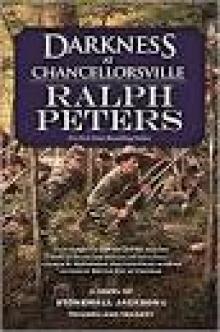 Darkness at Chancellorsville
Darkness at Chancellorsville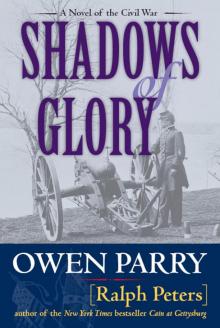 Shadows of Glory
Shadows of Glory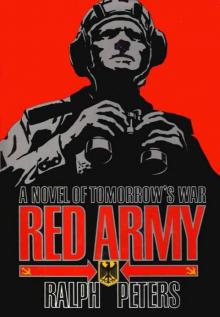 Red Army
Red Army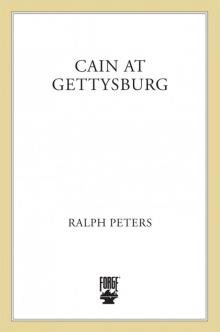 Cain at Gettysburg
Cain at Gettysburg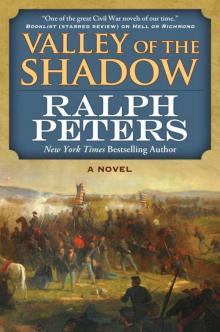 Valley of the Shadow: A Novel
Valley of the Shadow: A Novel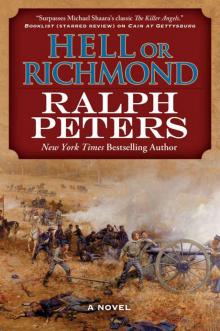 Hell or Richmond
Hell or Richmond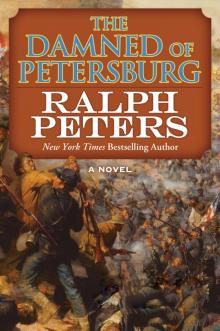 The Damned of Petersburg
The Damned of Petersburg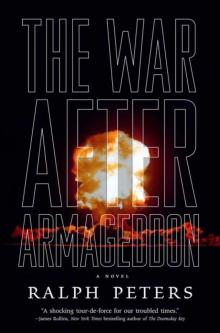 The War After Armageddon
The War After Armageddon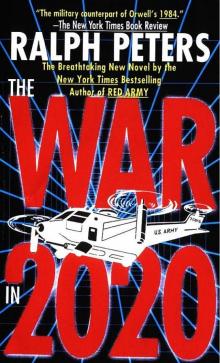 The War in 2020
The War in 2020